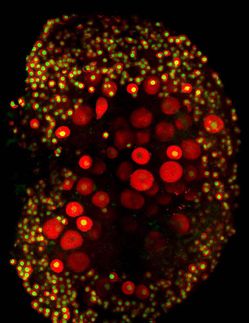2013 Louis-Jeantet Prize for Medicine
Advertisement
The 2013 Louis-Jeantet Prize FOR MEDICINE is awarded to the geneticist, Michael Stratton, director of the Wellcome Trust Sanger Institute, and jointly to the German biochemists Peter Hegemann, researcher at the Department of Experimental Biophysics at the Humboldt University, and Georg Nagel, researcher at the Institute Julius-von-Sachs at the Biocenter, University of Wurzburg.
The LOUIS-JEANTET FOUNDATION grants the sum of CHF 700'000 for each of the two 2013 prizes, of which CHF 625'000 is for the continuation of the prize-winner's work and CHF 75’000 for their personal use.
The prize-winners are conducting fundamental biological research which is expected to be of considerable significance for medicine.
Michael Strattonis awarded the 2013 Louis-Jeantet Prize for Medicine for his work aimed at understanding the genetic causes of human cancer.
The British researcher is one of the worldwide leaders in the study of cancer genomics and genetics. He notably directed the team that discovered the BRCA2 gene which, when mutated, causes predisposition to breast and ovarian cancer. Through the Cancer Genome Project started in 2000 at the Wellcome Trust Sanger Institute under his aegis, Michael Stratton demonstrated the presence of mutations in the BRAF gene in 60% of cases of malignant melanoma. Eight years later this discovery led to the development of new, and for the first time successful, treatments against this serious form of skin cancer.
Peter Hegemann and Georg Nagel are jointly awarded the 2013 Louis-Jeantet Prize for Medicine for their discovery of ion channels that can be activated by light. They have thus created a new and most promising discipline in the field of neurosciences - “optogenetics”.
Peter Hegemann showed that photosensitive proteins controlled the movements of the microscopic green alga Chlamydomonas reinhardtii, which only moves in function of its exposure to light. Georg Nagel showed that rhodopsins from microbes, including the ones from the alga, can be brought into animal cells where they function well and their working can be studied. Together they studied the functionality of these proteins in depth. They thus discovered the unique property of ion channels that may be activated under exposure to light and are usable for the study of neural circuits in vitro and in vivo with so far unmatched levels of precision. The two researchers thus initiated a new discipline – optogenetics - that offers an entirely new perspective for the treatment of certain neurological diseases in particular.

























































